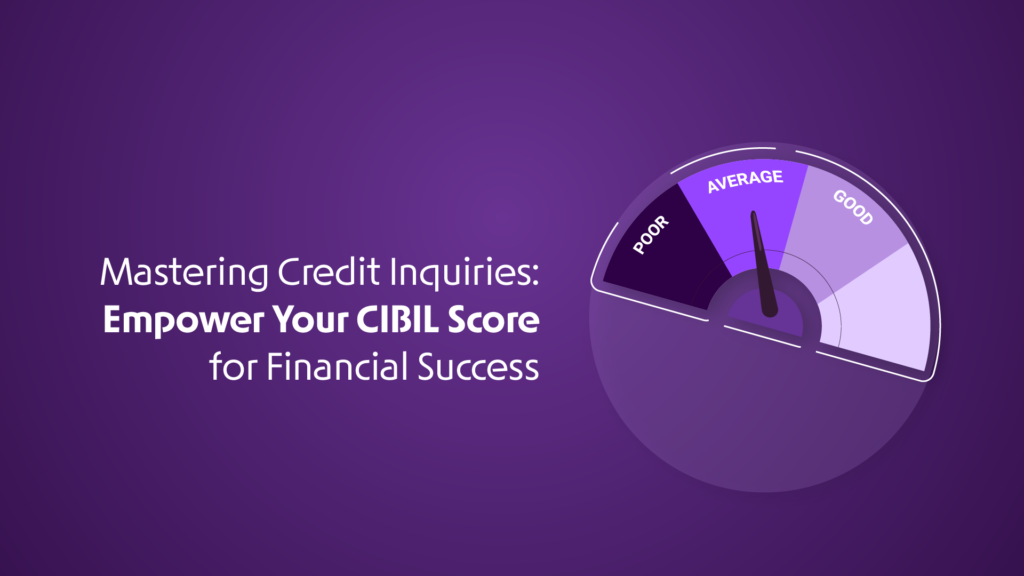Your credit score is an essential factor that lenders consider when you apply for a loan. It reflects your creditworthiness and plays a significant role in determining your loan approval. Part of this process involves a credit inquiry, where lenders or authorized individuals assess your credit history. In this blog, we will delve into the types of credit inquiries, their impact on your CIBIL score, and the importance of managing them wisely.
The Two Types of Credit Inquiries:
Credit inquiries can be broadly classified into two types: hard and soft inquiries. Understanding the difference between them is essential to grasp how they influence your credit score.
Hard Credit Inquiry: A hard credit inquiry occurs when a lender or financial institution pulls your report to evaluate your creditworthiness as part of the loan application process. Each hard inquiry can cause a reduction of 5 points in your CIBIL score. This inquiry is typically triggered when you apply for a new credit card, mortgage, or personal loan. Hard inquiries typically remain on your credit reports for a minimum of two years. Applying for multiple loans or credit cards within a short period can result in numerous hard inquiries, potentially damaging your credit score.
Soft Credit Inquiry: A soft credit inquiry is performed when you check your own credit score or when a lender or credit-card companies preapprove you for a loan or credit card. They conduct a background check without your explicit request. Soft inquiries do not affect your credit score. Soft inquiries allow you to monitor your credit score and financial standing without negative consequences.
The Impact of Credit Inquiries on Your CIBIL Score:
Understanding how credit inquiries affect your CIBIL score is crucial for managing your credit health effectively. Here, we explore the impact of both hard and soft inquiries on your credit score.
Impact of Hard Inquiries: Hard inquiries have a direct impact on your credit score and can potentially lower it. While a single hard inquiry may only result in a minor score reduction, multiple hard inquiries within a short period can raise concerns among lenders. It signals increased credit-seeking behavior, potentially making you appear riskier to lend to. Hard inquiries typically remain on your credit report for at least two years, affecting your creditworthiness during that time.
Impact of Soft Inquiries: Unlike hard inquiries, soft inquiries have no adverse impact on your credit score. These inquiries are only visible to you and don’t affect your creditworthiness in the eyes of lenders. Monitoring your credit score through soft inquiries can help you stay updated on your financial health without any negative repercussions.
Managing Credit Inquiries Wisely:
Now that we understand the significance of credit inquiries and their impact on your CIBIL score, let’s explore some strategies for managing them wisely.
Limiting Hard Inquiries
To maintain a healthy credit score, it’s important to limit the number of hard inquiries on your credit report. Applying for multiple loans or credit cards within a short span of time can raise concerns among lenders and negatively impact your score. Instead, consider researching and comparing loan offers beforehand to choose the most suitable option. Additionally, focus on building a positive credit history to increase your chances of loan approval without the need for excessive hard inquiries.
Regularly Monitoring Your Credit Score
Taking advantage of soft inquiries to monitor your credit score regularly is an effective way to stay informed about your credit health. This enables you to identify any discrepancies or errors in your credit report and take corrective measures promptly. Many credit bureaus and financial institutions offer free credit score monitoring services, making it easier than ever to stay on top of your credit profile.
Seeking Professional Guidance
If you find your CIBIL score consistently dipping or have concerns about managing credit inquiries, seeking professional guidance from credit counselors or financial advisors can provide valuable insights. These experts can help you understand your credit profile better, provide personalized recommendations, and guide you toward building a stronger credit history.
Introducing OPEN Capital
If you are in need of business loans with low interest rates, OPEN Capital is a reliable online platform to explore. With OPEN Capital, you can access loans up to Rs. 30 lakhs at interest rates starting from as low as just 1% per month. The application process is 100% online, ensuring a seamless and hassle-free experience. Gone are the days of extensive paperwork; OPEN Capital simplifies the loan application process and provides efficient financing solutions for businesses.
Conclusion:
Understanding the different types of credit inquiries and their impact on your CIBIL score is crucial for maintaining a healthy credit history. While hard inquiries can temporarily decrease your credit score, practicing responsible credit management and limiting unnecessary applications can mitigate their negative effects. By adopting strategic credit habits, you can enhance your creditworthiness and improve your chances of securing favorable loan approvals in the future.
Remember, it’s essential to stay informed and take control of your credit journey. Follow us for more informative content on business loans and other financial topics to empower your financial decisions.
Stay tuned for more insightful content on business loans and follow us for regular updates! YouTube | Instagram



